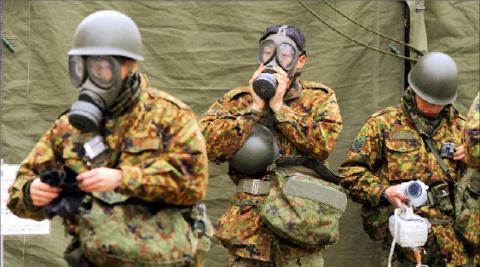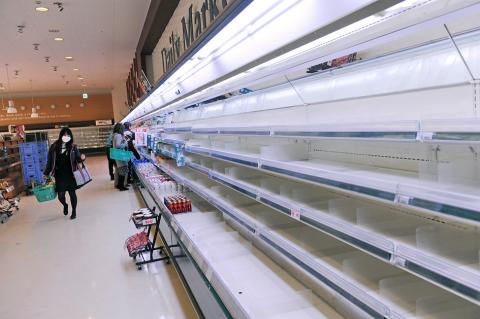Japan faced a potential catastrophe yesterday after a quake-crippled nuclear power plant exploded and sent low levels of radiation floating toward Tokyo, prompting some people to flee the capital and others to stock up on essential supplies.
Japanese Prime Minister Naoto Kan urged people within 30km of the facility — a population of 140,000 — to remain indoors amid the world’s most serious nuclear accident since the Chernobyl disaster in Ukraine in 1986.
Officials in Tokyo — 240km to the south of the plant — said only minute levels of radiation had been detected so far in the capital, which were “not a problem.”

Photo: Reuters
Radiation levels in the city of Maebashi, 100km north of Tokyo, and in Chiba Prefecture, nearer the city, were up to 10 times normal levels, Kyodo news agency said. Foreign experts disagreed on whether this was harmful or not.
About eight hours after the explosions, the UN weather agency said winds were dispersing radioactive material over the Pacific Ocean, away from Japan and other Asian countries. The Geneva-based World Meteorological Organisation added that weather conditions could change.
Two of the reactors exploded on Tuesday at the Fukushima Dai-ichi plant after days of frantic efforts to cool them. Kyodo news agency said the nuclear fuel pool at the No. 4 reactor might be boiling, suggesting the crisis is far from over at the plant.

PHOTO: AFP
“The possibility of further radioactive leakage is heightening,” a grim-faced Kan said in an address to the nation. “We are making every effort to prevent the leak from spreading. I know that people are very worried, but I would like to ask you to act calmly.”
Levels of 400 millisieverts per hour had been recorded near the No. 4 reactor, the government said. Exposure to more than 100 millisieverts a year is a level which can lead to cancer, according to the World Nuclear Association.
The plant operator pulled out 750 workers, leaving just 50, and a 30km no-fly zone was imposed around the reactors. There have been no detailed updates on what levels the radiation reached inside the exclusion zone where people live.
“Radioactive material will reach Tokyo but it is not harmful to human bodies because it will be dissipated by the time it gets to Tokyo,” said Koji Yamazaki, professor at Hokkaido University graduate school of environmental science. “If the wind gets stronger, it means the material flies faster, but it will be even more dispersed in the air.”
Despite pleas for calm, residents rushed to shops in Tokyo to stock up on supplies. Don Quixote, a multi-storey, 24-hour general store in Roppongi district, sold out of radios, flashlights, candles and sleeping bags.
In a sign of regional fears about the risk of radiation, China said it would evacuate its citizens from areas worst affected, but it had detected no abnormal radiation levels at home. Air China said it had canceled flights to Tokyo.
Several embassies advised staff and citizens to leave affected areas. Tourists cut short vacations and multinational companies either urged staff to leave or said they were considering plans to move outside Tokyo.
“I’m scared. I’m so scared I would rather be in the eye of a tornado,” said 10-year-old Lucy Niver of Egan, Minnesota, who was on holiday in Japan. “I want to leave.”
Japanese media have became more critical of Kan’s handling of the disaster and criticized the government and nuclear plant operator Tokyo Electric Power Co (TEPCO) for its failure to provide enough information on the incident.
Kan himself lambasted the operator for taking so long to inform his office about one of the blasts, demanding to know “what the hell is going on,” Kyodo reported.
Kyodo said Kan had ordered TEPCO not to pull employees out of the plant.
“The TV reported an explosion, but nothing was said to the premier’s office for about an hour,” a Kyodo reporter quoted Kan telling power company executives.
There have been a total of four explosions at the plant since it was damaged in Friday’s massive quake and tsunami. The most recent were blasts at reactors No. 2 and No. 4.
There was a real possibility of a leak in the No. 4 reactor container, which houses the nuclear fuel rods, according to Murray Jennex, a professor at San Diego State University in California.
Concerns center on damage to a part of the reactor core known as the suppression pool, which helps cool and trap the majority of cesium, iodine and strontium in its water. The nature of the damage was unclear, as was its impact on the containment structure, a thick steel vessel that surrounds the core.
The full extent of the destruction from last Friday’s magnitude 9.0 earthquake and tsunami that followed it was still becoming clear, as rescuers combed through the region north of Tokyo where officials say at least 10,000 people were killed.
Whole villages and towns have been wiped off the map by Friday’s wall of water, triggering an international humanitarian effort of epic proportions.

A magnitude 7.0 earthquake struck off Yilan at 11:05pm yesterday, the Central Weather Administration (CWA) said. The epicenter was located at sea, about 32.3km east of Yilan County Hall, at a depth of 72.8km, CWA data showed There were no immediate reports of damage. The intensity of the quake, which gauges the actual effect of a seismic event, measured 4 in Yilan County area on Taiwan’s seven-tier intensity scale, the data showed. It measured 4 in other parts of eastern, northern and central Taiwan as well as Tainan, and 3 in Kaohsiung and Pingtung County, and 2 in Lienchiang and Penghu counties and 1

FOREIGN INTERFERENCE: Beijing would likely intensify public opinion warfare in next year’s local elections to prevent Lai from getting re-elected, the ‘Yomiuri Shimbun’ said Internal documents from a Chinese artificial intelligence (AI) company indicated that China has been using the technology to intervene in foreign elections, including propaganda targeting Taiwan’s local elections next year and presidential elections in 2028, a Japanese newspaper reported yesterday. The Institute of National Security of Vanderbilt University obtained nearly 400 pages of documents from GoLaxy, a company with ties to the Chinese government, and found evidence that it had apparently deployed sophisticated, AI-driven propaganda campaigns in Hong Kong and Taiwan to shape public opinion, the Yomiuri Shimbun reported. GoLaxy provides insights, situation analysis and public opinion-shaping technology by conducting network surveillance

‘POLITICAL GAME’: DPP lawmakers said the motion would not meet the legislative threshold needed, and accused the KMT and the TPP of trivializing the Constitution The Legislative Yuan yesterday approved a motion to initiate impeachment proceedings against President William Lai (賴清德), saying he had undermined Taiwan’s constitutional order and democracy. The motion was approved 61-50 by lawmakers from the main opposition Chinese Nationalist Party (KMT) and the smaller Taiwan People’s Party (TPP), who together hold a legislative majority. Under the motion, a roll call vote for impeachment would be held on May 19 next year, after various hearings are held and Lai is given the chance to defend himself. The move came after Lai on Monday last week did not promulgate an amendment passed by the legislature that

AFTERMATH: The Taipei City Government said it received 39 minor incident reports including gas leaks, water leaks and outages, and a damaged traffic signal A magnitude 7.0 earthquake struck off Taiwan’s northeastern coast late on Saturday, producing only two major aftershocks as of yesterday noon, the Central Weather Administration (CWA) said. The limited aftershocks contrast with last year’s major earthquake in Hualien County, as Saturday’s earthquake occurred at a greater depth in a subduction zone. Saturday’s earthquake struck at 11:05pm, with its hypocenter about 32.3km east of Yilan County Hall, at a depth of 72.8km. Shaking was felt in 17 administrative regions north of Tainan and in eastern Taiwan, reaching intensity level 4 on Taiwan’s seven-tier seismic scale, the CWA said. In Hualien, the